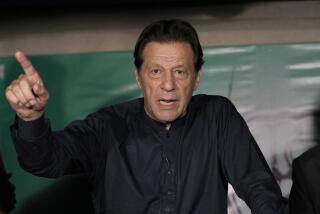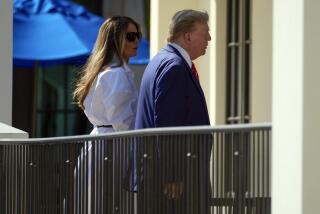Pakistan asks for revival of Zardari case
Reporting from Islamabad, Pakistan â A Pakistani government agency asked Swiss authorities Wednesday to revive money laundering charges against President Asif Ali Zardari, the latest in a series of setbacks that have weakened the Pakistani leaderâs standing in the nuclear-armed state.
The move came a day after Supreme Court Chief Justice Iftikhar Mohammed Chaudhry threatened to jail the top official of the countryâs anticorruption agency if he did not reopen cases against Zardari and other bureaucrats and businesspeople within 24 hours.
A lawyer for the agency, the National Accountability Bureau, told Chaudhry in court Wednesday that the government had sent a letter to Switzerland seeking renewal of corruption charges against Zardari.
Swiss prosecutor Daniel Zappelli told the Associated Press later Wednesday that Zardari could not be prosecuted in Switzerland unless Pakistan first eliminated the immunity that its head of state is granted by the constitution.
Zardariâs political opponents have argued that he might still be vulnerable because his eligibility to be president may be in question. His failure to appear in a Pakistani court in 2004 in one case against him could be construed as a conviction, they say, and he therefore would have been ineligible to become president.
Zardari, husband of slain former Prime Minister Benazir Bhutto, has seen his stature in Pakistan erode considerably over the last year as pressure on him has mounted from an alliance that includes the countryâs military, opposition parties and news media critics.
He has already agreed to relinquish most of his presidential powers, including the authority to dissolve parliament and appoint armed services chiefs. Under a proposed constitutional amendment expected to be presented to parliament soon, most presidential powers would be transferred to the prime minister.
Zardariâs biggest battle, however, has been with the countryâs judiciary. In December, the high court struck down an amnesty that had shielded him and a number of other government officials and businesspeople.
The amnesty law, enacted in 2007 by then-military ruler Gen. Pervez Musharraf, was aimed at allowing Zardari and Bhutto to return from exile without the prospect of any politically motivated prosecution. After Bhutto was assassinated in December 2007, Zardari took over as head of her political party and was later elected president by national and provincial lawmakers.
The graft cases in Switzerland stem from Zardari and Bhuttoâs 2003 conviction in absentia on money laundering charges in Geneva. The case was suspended while the couple appealed, then dropped by Swiss authorities at the request of the Pakistani government in 2008.
Though the Pakistani government has revived the corruption cases against Zardari, his vulnerability to criminal charges remains in question.
Athar Minallah, a key leader in the âlawyers movementâ that forced Zardari to reinstate Chaudhry, who had been ousted by Musharraf, said he did not believe presidential immunity could be set aside. The only way a Pakistani president can be removed from office, he said, is through impeachment, which is unlikely in Zardariâs case because his opponents lack the two-thirds majority in parliament needed to achieve that.
âIf the president has to be removed, he has to be removed according to the letter and spirit of the constitution, which provides only for impeachment and no other mode for removal,â Minallah said.
In a country where anti-American sentiment runs strong, Zardari has been a valued ally of President Obama in the fight against terrorism. Under him, Pakistan has launched major offensives against Pakistani Taliban militants in the volatile northwest, and more recently has arrested several top Afghan Taliban leaders hiding in Pakistani cities and towns.
Among Pakistanis, however, Zardari is deeply unpopular. He is seen as emblematic of the corruption that has plagued the country for years, and is viewed by many as subservient to Washington.
alex.rodriguez@
latimes.com
More to Read
Sign up for Essential California
The most important California stories and recommendations in your inbox every morning.
You may occasionally receive promotional content from the Los Angeles Times.










